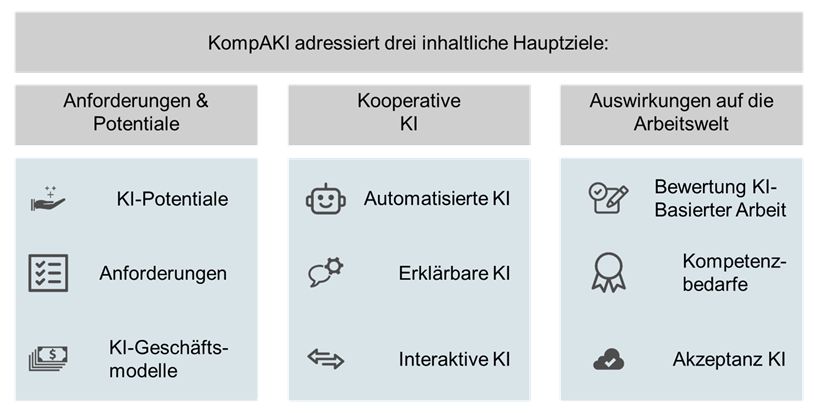KompAKI
Developing automated AI tools to increase level of automation while preparing tabular data in ML pipelines.
The KompAKI project is dedicated to establishing a center of excellence for Artificial Intelligence (AI) in the workplace, situated in the Rhine-Main area of Germany. KompAKI is a national initiative, which receives partial funding from the German Federal Ministry of Research and Education (BMBF). This initiative boasts a robust collaboration of 19 partners from both industry and academia. It includes 11 research affiliates from the Technical University of Darmstadt and the Darmstadt University of Applied Sciences, alongside eight corporate entities. Additionally, the IHK Darmstadt Service GmbH and affiliated partners such as IG Metall contribute significantly to the project, enriching it with a diverse range of expertise and resources. The KompAKI project underscores the necessity for a tightly integrated approach to AI development and labor research. Currently, within the corporate setting, there is a notable scarcity of experience when it comes to incorporating AI methodologies into existing processes. This highlights the importance of fostering a seamless fusion of technological innovation and practical workplace application, ensuring that the benefits of AI can be fully realized in an industrial environment.
To effectively tackle the challenges at the intersection of AI development and workplace integration, KompAKI has established three primary objectives, each designed to address a different facet of the issue. The first objective focuses on the research and development of new applications for AI-based systems within the workplace. This involves a detailed analysis of the requirements and potential of AI technologies in various work environments. It is imperative to recognize when the deployment of an AI system is advantageous, taking into consideration factors such as data structure compatibility and the system’s integration with existing IT infrastructure.

Transitioning smoothly to the second objective, KompAKI aims to innovate new methods for cooperative AI. This encompasses the creation of AI systems that are not only automated but also explainable and interactive. Such systems allow non-expert users to operate AI tools effectively and to understand the rationale behind AI decisions. The emphasis on explainability ensures that AI decisions are transparent, fostering trust and allowing for the fine-tuning of algorithms based on user feedback and outcomes. The third objective marks a progression towards the establishment of evaluation methods for AI-based work systems. These methodologies will serve as a benchmark to measure how well these AI systems are assimilated into work processes and how they contribute to achieving business objectives. By setting clear evaluation standards, KompAKI aims to ensure that AI tools bring tangible benefits and drive efficiency in the workplace.
Within the KompAKI project framework, our contributions are two-fold: research and pilot project implementation. In the research domain, we are investing efforts into the investigation of innovative tools that streamline the process of automated data preparation, which is a crucial step in ensuring data quality and relevance for AI applications. Additionally, we are focusing on the orchestration of automated Machine Learning (ML) pipelines, aiming to enhance the efficiency and scalability of ML model development. Furthermore, our research extends to the development of tools that increase the transparency of ML models and the data that feeds into them. This aspect of our work is vital, as it addresses the growing need for explainable AI — where users and stakeholders can understand and trust the AI decision-making process. By improving transparency, we aim to demystify the ML models and provide clear insights into how the input data is being utilized, fostering greater confidence in the outcomes derived from AI systems. Through these endeavors, the project aspires to not only push the boundaries of AI technology but also to pave the way for its responsible and ethical use in various work environments.
Building on our research foundation, we leverage the tools developed to design and implement an AI-powered Human-Machine Interface (HMI) solution tailored for industrial settings. By harnessing the advanced capabilities of ML models, our goal is to fundamentally transform the interaction between machine operators and their equipment. The envisioned HMI solution will utilize intuitive interfaces augmented by AI to facilitate more efficient operator control and oversight. This will not only streamline operations but also enable predictive maintenance capabilities, where the AI can anticipate potential issues before they lead to machine downtime. By proactively addressing these concerns, we anticipate a significant reduction in maintenance costs. Moreover, the integration of AI into the HMI aims to deliver real-time analytics and insights, empowering operators with the knowledge to make informed decisions swiftly. This enhancement in machine operability and the subsequent increase in productivity exemplify the tangible benefits that AI can bring to the industrial sector. Through this practical application of our research, we aim to set a precedent for the future of smart manufacturing and industrial automation.